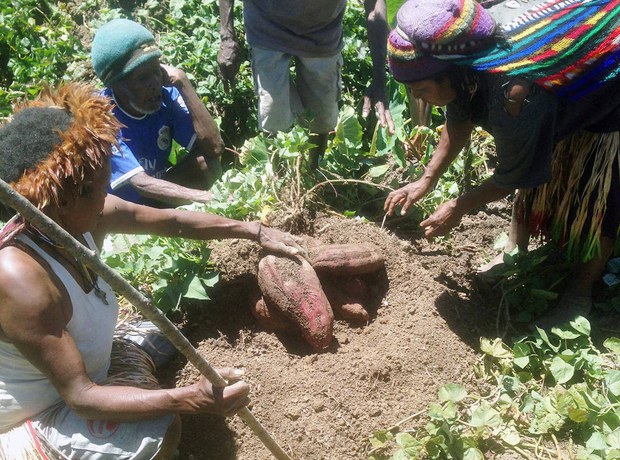Indonesia: Papua’s Sweet Potato Tradition Attempts Comeback
2015.11.13
 Residents of Kimbim Village in Jayawijaya district, in Indonesia’s Papua province, harvest sweet potatoes in their backyard, Nov. 4, 2015.
Residents of Kimbim Village in Jayawijaya district, in Indonesia’s Papua province, harvest sweet potatoes in their backyard, Nov. 4, 2015.
Community leaders are trying to revive sweet potato cultivation in the highlands of central Papua, where consumption of this nutritious staple has been all but replaced by the rice-eating culture that dominates most of Indonesia.
Sweet potatoes (Ipomoea batatas) are popular among peoples of the Pacific Islands because the plant can thrive in extreme weather.
In the Lapago and Meepago tribal areas of Papua – Indonesia’s easternmost province – generations have relied on sweet potatoes as a food staple. In Meepago, it is called “nota,” while in Lapago, it is “mbe” or “hipere.” Most Papuans call sweet potatoes “petatas.”
Nobody knows when sweet potatoes were first cultivated in Papua’s mountainous areas, but people in Wamena (Lapago) or Paniai (Meepago) claim the plant has been around since their ancestors settled the region.
Sweet potatoes, however, fell out of favor in Papua when former Indonesian President Suharto launched a campaign to make Indonesia self-sufficient through rice production. As a result, the Papuan tradition of eating petatas faded and local people became assimilated into a rice-eating culture that dominates most of Indonesia.
Wamena resident Kiloner Wenda recalls how local teachers used to tell students that those who ate sweet potatoes would not succeed in life.
“When I was still in elementary school, my teachers always said if I eat sweet potatoes, I will be stupid. Then every time our parents served sweet potatoes during meal times in our honai [Papuan traditional house], we doubted whether we should eat them,” Kilonar told BenarNews.
“We always found a way to eat rice. Our parents found out somehow, and they worked harder to earn more money to buy us rice, although it was difficult for them as farmers.”
But that was decades ago. Now, the government provides subsidized rice to villagers. Kilonar said the subsides spoiled people, causing many to leave farming.
“It is tragic. When the world has been carrying out efforts in diversifying foods, our people decided to turn to consuming rice,” he said.
Campaign supports sweet potato consumption
In addition, soaring transportation costs in Papua have made it hard for farmers to sell their sweet potatoes in villages and cities. Seven years ago, a campaign began to encourage farmers in Jayawijaya district to bring their crops to appointed collection points.
Kiloner set up a collection point in Kimbim village.
He collected, weighed, assessed and transported the sweet potatoes to the nearby city of Wamena, hoping to sell off the petatas. Over the next few days, he distributed the sales proceeds to the farmers.
The effort changed people’s views on sweet potatoes.
“Now we have more money for the kids to go to school,” Maria Asalokobal, of Kimbim village, told BenarNews. “We usually planted the crop only to feed the family and cattle.”
Petatas deeply rooted in culture
In the Baliem Valley, farming is a way of life passed down from generation to generation.
“And sweet potatoes to the people of Baliem is as important as the people themselves. The plant does not just contain high nutrients, but also traditional values. Educational values were taught and passed to kids from their parents on farms where sweet potatoes are cultivated,” Kiloner said.
“Parents taught everything about life, including ethics, morals and family education.”
In 2009, Asalokobal, chief of the tribe in the Assologaima area, gave 10 hectares (24.7 acres) for people to start cultivating sweet potatoes again, because he worried about the future of his tribe and its traditions. The changes, he said, have happened so fast.
“The subisidized rice program still goes on. That makes villagers lazy to start farming again. They decided to stay in big cities. I still own a vast [piece of] land. I will let them farm sweet potatoes because that’s the way we live, the people of Baliem,” he said.







